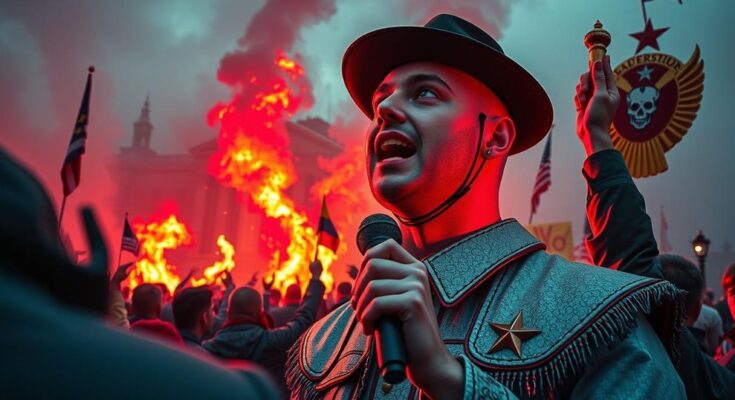In Romania’s recent presidential elections, Calin Georgescu unexpectedly gained traction as a far-right candidate through significant TikTok manipulation, with revelations of Russian interference via bot farms. The elections’ integrity came into question, resulting in the Constitutional Court annulling the results. Calls for reforms in social media regulation to protect electoral legitimacy became paramount, amidst ongoing European Commission investigations into TikTok’s role in the electoral turmoil.
In November 2023, Romania conducted its presidential elections, leading to unexpected turbulence following the rise of Calin Georgescu, an independent candidate known for his far-right views, who utilized TikTok aggressively for campaigning. His electoral success, which included nearly 23% of the vote, startled many, as Georgescu was previously an obscure figure in the political landscape. However, investigations revealed alarming evidence of manipulation and foreign interference, notably by Russian actors using sophisticated means, including the deployment of bot farms on TikTok that bolstered his campaign capabilities.
The Romanian government responded to the overwhelming evidence of electoral fraud—artistically termed as “electoral doping.” Reports emerged indicating that tens of thousands of fake accounts were mobilized to promote Georgescu’s campaign, alongside significant financial transactions that fueled the concerning activities. The Romanian President, Klaus Iohannis, announced that investigations would be launched to uncover the depths of Russian tampering in the elections. The intense scrutiny placed on TikTok further triggered discussions about the platform’s role in detrimental interactions affecting democratic processes.
Amidst the uproar, protests erupted throughout Romania, focusing on the perceived dangers posed by the rise of populist politics backed by foreign interference. Political stakeholders and pro-European parties convened to form coalitions to ensure the protection of democratic frameworks. However, the coalition negotiations faltered due to the chaos surrounding the elections, resulting in extended political turmoil as the Constitution obliged President Iohannis to retain his position until a successor is duly defined.
On December 6, the Romanian Constitutional Court controversially annulled the election results due to reported violations during the electoral campaign, marking a significant judicial intervention in what many termed a threatened political landscape. The situation exposed a lack of faith in the electoral process among various factions, while escalating social media campaigns, particularly through TikTok, further complicated the discourse. The ramifications of these events have led to calls for a wider inquiry into foreign influences and the broader implications of social media on the integrity of elections.
In light of these incidents, the European Union commenced investigations into potential violations arising from TikTok’s role in this electoral crisis. The European Commission is scrutinizing whether TikTok failed to adequately address the risks posed by foreign interference, particularly emphasizing the platform’s obligation under the Digital Services Act.
As Romania navigates this precarious chapter, the broader European political architecture, reliant on genuine democratic processes, faces questions about safeguarding elections from external influences. Proactive measures to regulate social media platforms and enhancing public awareness surrounding electoral manipulation are now imperative to protect the integrity of democratic expressions across Europe.
The Romanian presidential elections have awakened concerns regarding the utilization of social media, particularly TikTok, as a powerful tool for political campaigning and manipulation. The 2023 elections saw Calin Georgescu, an independent candidate linked to far-right politics, unexpectedly achieving significant electoral success. Reports of coordinated foreign interference, particularly by Russian entities utilizing advanced technological schemes such as bot farms, sordidly revealed the vulnerabilities inherent in contemporary electoral processes. Additionally, heightened tensions surrounding these elections prompted deeper investigations into the complicated relationship between social media platforms and the democratic institution, underscoring the urgent need for regulatory frameworks.
The tumultuous series of events following the Romanian presidential elections highlights the critical intersections of social media influence, foreign intervention, and electoral integrity. With the annulment of election results, the legitimacy of the electoral process has been severely undermined, requiring urgent reviews and reforms in electoral laws and social media accountability measures. As investigations unfold, Romania stands at a crossroads, demanding immediate collective action at both national and EU levels to mitigate these emerging threats to democracy.
Original Source: uacrisis.org




